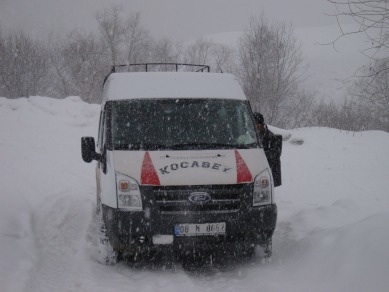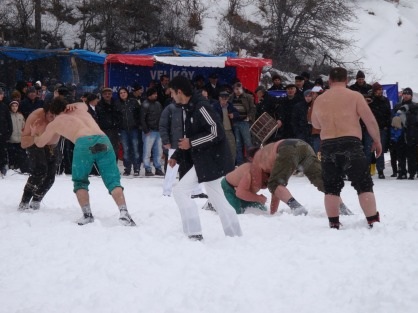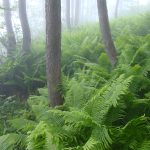“Berbat, çok berbat (awful, really awful).”
Believe me, these are not the words you want to hear when attempting to cross the Çam Geçidi (Pine Pass, 2460m) between Ardahan and Şavşat in the depths of one of the worst winters Turkey has had for years.
I’d had a sneak preview just a day beforehand when I’d transited the pass in the other direction, my heart in my mouth as snow billowed in the air and the “road” shrank to a couple of thin black lines sketched in the ice. It was bad enough on the Ardahan side but became much worse once we reached the summit and started the ascent to Şavşat, switchblading down the mountainside and slithering to a halt on every bend as the driver eased the minibus round it as gingerly as if he were steering his way through a minefield.
Insofar as I’d felt able to think about it, the surrounding scenery – a black and white vista of pine-clad slopes – had certainly been dramatic, and I marvelled as we passed the pretty little wooden cabins of the high-yayla settlement of Kocabey unmarred (so far) by any concrete developments. Then we’d come upon a disconcerting sight. One of the huge Caterpillars tasked with keeping the roads open was lying in the ditch at a broken-leg ankle, its great wheels, chained to prevent just such an occurrence, pointing straight up at the sky. Three men were huddled beside it, staring gloomily into the ditch. One must have been the driver, presumably thanking his lucky stars for a narrow escape. The other two must have been the crew of the truck parked across the road, which we had been leapfrogging all the way from Ardahan. Presumably it was their job to take a look at what had happened and decide what to do about it.
It was a relief, then, to round a bend and see, beside the road, the Laşet Motel where I planned to spend the night, hoping to set out again in the morning to the village of Veliköy which was due to host Turkey’s one and only annual bout of kar güreşi (snow wrestling).
It had all seemed so simple in the summer of 2012 when I’d spotted a dog-eared poster for last year’s event still posted in a shop window. The Çıldır lake was said to freeze so solidly that you could drive across it in a sleigh a la Dr Zhivago. I would come back in February, take to the lake for a ride, then speed on over to Veliköy for the wrestling, following up with a stay in the nearby Karagöl Pension where I’d seen pictures of guests breakfasting on the frozen lake in front of it.
Arriving in Kars, I soon discovered the error of my ways. The sleighs only took to the lake at the weekend. At any other time I’d have to pay a fortune to have them brought specially from Çıldır. That was tricky given that the snow wrestling was also a weekend event but in a completely different location.
Then there was the problem of accommodation. Last summer I’d stayed in Arpaçay, one possible base for getting to the lake. There a suite in the Öğretmen Evi had cost a grand TL20 which said everything for what was on offer. Come 6pm there was nowhere to get a meal. I was in no rush to repeat that grim experience in winter.
But at the Laşet Motel they were used to seasonal difficulties. One quick call to the muhtar of nearby Kocabey and a lift was organised to get me to the wrestling in the morning which was when I discovered that I was gatecrashing the village men’s annual winter outing. Still, we were a happy little gang setting off in the minibus as if on a school excursion. First stop, Şavşat for a quick bowl of lentil soup, then on we sped along a new road that hadn’t even existed when I’d visited in the summer but which sliced a handy six kilometres off the journey.
As we drove along the snow started to fall again and it was still falling when we pulled up beside a motley collection of cars and minibuses on the far side of the village. The wrestling was taking place on a piece of level ground jutting out from the hillside where an open-fronted tent had been set up for dignitaries. It boasted a small electric bar fire sitting beside a table adorned with the vase of plastic flowers that is a staple of all public events. Facing it across the field was a second tent where the wrestlers could disrobe while their names were announced. Above it a flag portrait of Atatürk shivered in the wind.
The only foreigner present, I was ushered to the front row of the tent, there to sit beside the Şavşat Kaymakam and Vali although not, sadly, within the limited radius of the warmth from the fire. Almost immediately came the sound of the davulzurna (drum and oboe) and the first of the wrestlers, striplings of boys aged 12 or 13, peeled off their shirts and padded out into the snow clad only in shorts that reached down to their knees.
The action was short-lived for which I could only thank heaven. Then slowly but surely the real business of the day began as a sequence of men of ever-increasing bulk and weight swaggered out to do battle with each other.
Basically it was a rerun of the more familiar oil wrestling bouts of Edirne except without the oil and with green leather pants taking the place of the usual brown. But they’d come from far and wide, these wrestlers. Most were from the Black Sea and its hinterland although there were also pehlivans from İstanbul, Ankara and Edirne, and from neighbouring Georgia. I fell to chatting with the ex-muhtar of Veliköy whose idea this had been some seventeen years ago. “People used to fight in the snow around here anyway,” he said. “We just formalised it. The only other place they do this in the world is Switzerland and there they do it fully clothed.”
Still the snow kept falling as the drums beat on and a bagpiper strutted his stuff, carrying a tulum that looked more like a hotwater bottle in a furry cover than a musical instrument. In between exhortations to the men to come forward as soon as their name was read out (code for “get a move on – we’re bloody freezing here!”), their vital statistics were read out with all the relish of beauty contests. Every now and then there was a break in the action so that the dignitaries could wade through the snow to the podium to give repeated thanks to the organisers. At one point we all rose to our feet in the silence of the falling snow to sing the national anthem.
But it was getting colder and colder and the occasional glass of çay couldn’t keep the chill from seeping into our bones. The first to slink away were the women. By the time the really big beasts were ready for their moment in the limelight only a hardy few souls were still hanging on.
Four enormous wrestlers were still grappling with each other like sumos in the snow when the Kocabey muhtar sidled up beside me and suggested we call it a day. It was just as well that he did because the snow was once again falling and by the time we reached the far side of Şavşat the road we’d taken in the morning had completely vanished. It was with immense gratitude that I let the driver take me right to the gate of the motel. As I waved goodbye to my new-found friends I knew that they would struggle even to turn the bus round in the drifts piled up by the side of the road (to be continued).
Written: February 2013




4 Comments
. . lucky enough to have our ‘adopted Turkish son’ who, as a kaymakam, was posted to many different parts of the Eastern Turkey. I’ve only visited the area in the Spring/Summer, but his stories of Ardahan and Erzurum in the winter are dramatic to say the least. That said, I love that part of the country, exploring off the beaten tracks and enjoying the hospitality from villagers.
This is the first time I’ve heard of snow wrestling. Fascinating stuff.
And last time, hopefully! Believe me, it was freezing. But interesting, of course.
Sorry for delay in response – system to notify me of comments was turned off!
Alan, I really love Eastern Turkey. Always something waiting round every corner. Although have to say that after this Feb trip in the snow I’m restricting future visits to summer too.